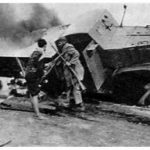The government of C. Metaxàs, which became a dictatorship on August 4, 1936, was gradually modeling itself on the Fascist example.
Not without strong opposition, since contrary demonstrations took place at the end of 1937; on January 28, 1938, some politicians and officers opposed to the regime were arrested and deported; July 29 in Crete suppressed a revolt led by a nephew of E. Venizelos. Externally, despite the fact that the Greek people by tradition and interest were inclined to England, Metaxàs followed a policy of rapprochement with Italy and Germany, also driven by his personal sympathies and the character of his government. The sending of a consul to Addis Ababa (December 14, 1936) represented a tacit acknowledgment of the conquest of Ethiopia; at the Balkan conference in Belgrade (4-6 May) Greece obtained that the military guarantee was intended to be limited to the case of aggression by another Balkan nation; in July he entered into an economic treaty with Germany. The following year he signed treaties of friendship and neutrality with Turkey (April 27) and with Bulgaria (July 31, 1938).
The occupation of Albania by Italy (April 1939) put Greece into serious alarm; in September the outbreak of hostilities between Germany and Poland, while imposing a policy of extreme prudence on Metaxàs to save Greece’s neutrality, also naturally recommended military defense measures. The situation seemed to improve on November 3 with the official news of an exchange of notes between Italy and Greece, according to which, at the end of the Italo-Greek friendship pact of 1928, the two governments declared that they wanted to stick to the same for the future. principles that had inspired that covenant. Mussolini spontaneously ordered the withdrawal of Italian troops from the Greek-Albanian border; and similar measures taken on the other side by the Greek government.
The Italian intervention (10 June 1940) suddenly plunged Greece into the very theater of military operations, in a very difficult position: bordering one of the Axis powers, protected by the English guarantee, close to the English and Italian naval bases, in material incapacity to always preclude belligerent ships from its territorial waters. The speech with which Mussolini had announced Italy’s entry into the war contained a declaration towards the minor neutral powers which was intended to be both reassuring and threatening. On 12 August the radio and the Albanian and Italian newspapers reported the killing of the Albanian Daut Hoggia, drawing reason for the exaltation of the irredentism of the Albanians of Ciamuria. On August 15, at the island of Tino, Helli was hit by three torpedoes, which the Hellenic commission of inquiry recognized as being of Italian origin. At three a.m. on October 28, a few hours before Mussolini’s meeting with Hitler, the Italian minister in Greece delivered an ultimatum to the government of Metaxàs in which he accused Greece of excessive tolerance towards the violations of neutrality by the English, and yes he asked for free passage across the border to the Italian troops, so that they could occupy some strategic points in Greek territory. Thus began the war, in which the Greek people gave singular proof of its worth.
The concern of the Metaxàs government was at first that of keeping British aid within inconspicuous limits, in a desperate attempt to ward off German intervention as far as possible; however on January 28, 1941 the gen. Wavell was in Athens to implement military action plans. The day after gen. Metaxàs died of illness and was succeeded by Alexander Koritzis, former governor of the Bank of Greece. After the invasion of Bulgaria and Yugoslavia, on 6 April the German troops crossed the Yugoslav border: the British, engaged in Africa by the Italo-German counter-offensive, could only send little aid, so that the military situation quickly collapsed. On April 28 the first German troops entered Athens: meanwhile the head of the Greek government, Koritzis, he died suddenly (April 19) and King George and his family had moved to Crete (April 23) to continue the struggle. Between 29 April and 11 May the Italian troops completed the occupation of the Ionian and Aegean islands (except Samothrace, Thasos and Lemnos already occupied by the Germans). On May 20, the Germans began landing operations in Crete, which lasted until June 1, with the participation of Italian contingents from May 29. King George had left Crete on May 22 to move to Cairo with his government (President E. Tsúderos). Thasos and Lemnos already occupied by the Germans). On May 20, the Germans began landing operations in Crete, which lasted until June 1, with the participation of Italian contingents from May 29. King George had left Crete on May 22 to move to Cairo with his government (President E. Tsúderos). Thasos and Lemnos already occupied by the Germans). On May 20, the Germans began landing operations in Crete, which lasted until June 1, with the participation of Italian contingents from May 29. King George had left Crete on May 22 to move to Cairo with his government (President E. Tsúderos).
After his meeting with Hitler on 2 June, on 10 June Mussolini was able to declare to the Chamber that Greece was entering the “vital space” of Italy and that this was taking over its military garrison. In reality, Germany kept under its direct occupation Western Macedonia with Thessaloniki, the islands of Lemnos, Lesbos, Chios, Skyros and Milos, and a strip to the right of the Maritza along the Turkish border, while Bulgaria was entrusted with the occupation of the Eastern Macedonia, Thrace from Struma to Maritza, the islands of Thasos and Samothrace and the Florina basin. After 8 September 1943 the Italian occupation troops were everywhere overwhelmed and replaced by the Germanic ones; notable episodes of resistance occurred especially in Thessaly and Epirus (Pinerolo division, Lancers of
The period of occupation was very sad: the country suffered from a famine that cost the lives of more than 300,000 people (relief was sent through the Swedish Red Cross). Particularly heavy was the occupation of the Bulgarians, whom the Greeks accuse of having carried out a violent work of denationalization. It was not long in the Peloponnese and in the rest of Greece to form resistance groups, which acted in conjunction with the allied commands; while contingents of fugitive Greeks were organized in Cairo and then participated in the Italian campaign. Important from a military point of view were, in the early days of the occupation, the sabotage actions of the Athens-Thessaloniki railway line, one of the supply routes of the Germanic army in Africa: these were carried out under the direction of British officers. Then, after the Axis troops had evacuated Africa and the Allied offensive against Italy was directed, the action of the Greek partisans entered more decisively within the framework of the Balkan resistance.
The highest political organization, the EAM (‘Εϑνικὸν ἀπελευϑερωτικὸν μέτωπον, “National Liberation Front”), on which ELAS (‘ Εϑνικὸς λαϊκὸς στρατός, “People’s National Liberation Army”) depended, Bulgarian, Yugoslav and Albanian organizations, the Communist Party’s pre-eminence increasingly asserting itself among the other left and center parties who also adhered to it. A right-wing organization opposed it in the EDES (‘Εϑνικὸς δημοκρατικὸς ἐλληξικὸς στρατός, “Greek National Democratic Army”), which under the command of gen. Napoleon Zervas had limited action, especially in Epirus. The actions of the partisans often provoked fierce reprisals by the Germanic authorities,
In the autumn of 1944 when the Allied landings began (Patras, October 4; Athens, October 13; Thessaloniki, November 1), large areas of Greece were already under the control of ELAS. Meanwhile, Prime Minister Giorgio Papandreu (who succeeded Tsúderos after a brief government of Sophocles Venizelos) had conducted a policy of rapprochement with the EAM, welcoming a large number of representatives in his government. Moving on 10 September from Cairo to Caserta, he did not take long to return to Athens, where the mountain brigade that had fought on the Italian front (Ravenna, Rimini) also arrived on 9 November. The situation was the most difficult: the population decimated by war, hunger, disease, agricultural and industrial equipment upset, communications were extremely difficult due to the almost total loss of railway equipment and the merchant fleet, and the financial situation was disastrous. From a political point of view, the institutional question was particularly hot, since the EAM took a position clearly opposed to the monarchy, and that of the disarmament of the partisans, which the EAM would have liked to condition for an equal dissolution of the armed forces of the right. On 2 December the resignation of the seven Communist ministers put Papandreu’s government in crisis and at the same time the first clashes between police and demonstrators took place in Athens; on 4 December a state of siege was declared and the protection of the order entrusted to the English garrison (gen. Ronald M. Scobie), while armed bands of ELAS flocked from the north. The British ministers, Churchill and Eden, who came personally to Athens, promoted (December 27, 1944) a meeting of the representatives of the various parties, under the presidency of the archbishop of Athens, Damaskinós. No agreement was reached; three days later King George of Greece consented to the regency of Archbishop Damaskinós (31 December) and, after the resignation of the minister Papandreu, gen. Nikolaos Plastiras was charged with setting up a left-wing liberal government, with the exclusion of the Communists (January 2, 1945). In the meantime, English reinforcements had arrived and engaged in a difficult battle with the ELAS troops in the streets of Athens. In mid-January, a truce was reached which ensured a quiet zone around Athens and Piraeus, and on 12 February 1945 in Várkiza, a suburb of Athens, an agreement was signed between the government and the EAM, following which all the leftist gangs committed themselves to the delivery of arms and the elections and the institutional plebiscite were prepared, to be carried out under the control of an inter-allied commission. The USSR declared that it would not participate in the control and the Communist Party ruled against it.
The action of the English government, which Churchill justified against bitter criticism as the only possible way to ensure, in the face of an armed minority and covertly supported by foreign powers, free consultation of all the people, represented the first open intervention in the civil struggles of the Greece, which was now being drawn into the game of rivalry between the Western powers and Russia. Shortly after (July 15), at the invitation of the minister P. Vulgaris, England took over the protection of the northern borders of Greece.
From the Várkiza conference to the elections there was a succession of governments, unable to face the enormous difficulties of the political and economic situation: the Plastiras cabinet, opposed by communists and monarchists, was followed (April 8) by Admiral Petros Vulgaris, with the participation of elements of the monarchy and of the right. The center-left cabinet of Themistocles Sofulis, launched on August 20 to serve as a mediation between opposing forces, also failed in its purpose. The Várkiza agreement remained a dead letter: instead of giving up their arms some ELAS groups turned to the mountains or crossed the border in preparation for the guerrilla warfare, and on the other hand the armed monarchical organizations grew. Overall there was a strengthening of the right, a natural consequence of the events of December-January.
On March 4, 1946, the EAM asked for a postponement of the elections, to which the center parties, and Sofulis himself, would have been in favor; but England and America opposed. The EAM then decided to abstain from the elections, indeed to boycott them; so that in the political struggle of March 31 only the right and center formations took part: the populist-monarchist concentration, the “National Patriotic Union” (moderate right: S. Papandreu, S. Venizelos, Panajotis, Kanellopulos). The populists had a substantial majority (220 seats out of 350); the abstentions were numerous, especially in the northern provinces.









